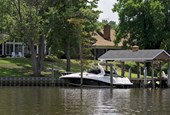
Key insights
- Water rights are based on various factors, including the state in which the property is located, the type of lake it is on and the legal description of the property itself.
- As a general rule, the adjacent property owners own all the way up to the water. While the public may boat or fish on any lake, they can only do so if there is a public access point to the lake.
- In Minnesota, the lakebed usually depends on the type of lake. In Wisconsin, most lakeshore owners only own up to the water line and the State owns the rest.
Homeownership can be complicated, but we also think it’s one of the most rewarding ventures out there. In our series, Ask an Edina Realty Lawyer, we are hoping to demystify some of the trickier aspects of buying, selling and owning a home.
In this edition, one of our lawyers discusses the water rights of lakefront property owners.
Dear Edina Realty Legal,
I am looking at buying a lakefront property. If I did, would I own the lake, or part of it?
Lawyers hate giving the answer, “it depends.” But water rights are based on various factors, including the state in which the property is located, the type of lake it is on and the legal description of the property itself. So, it depends.
Still, there are some rules of thumb that apply to waterfront properties in Minnesota and Wisconsin. First, the water that makes up the lake is not owned by any individual. Instead, it’s held by the state in trust for the public. If you can legally get to a lake, you can boat on it, for example.
A lot of people think that the states own the shoreline around every lake and the public is allowed to access the lake via this shoreland. This is not true. As a general rule, the adjacent property owners own all the way up to the water. While the public may boat or fish on any lake, they can only do so if there is a public access point to the lake.
It’s important to keep in mind the difference between a lakefront home and one with lake access. A lakefront home is situated directly on the waterfront, while a lake access property offers access to the lake or body of water, but someone else owns the property between it and the water.
What about the lake bed?
In Minnesota, who owns the lake bed, or floor of the lake, usually depends on the type of lake, and falls into one of three categories: navigable, meandered and not navigable/meandered.
Navigable: A “navigable” lake is generally one that was useable for commercial trade purposes back when Minnesota became a state in the 1800s. Not a lot of Minnesota’s many lakes fall into this navigable water category. But for those lakes, the State owns the bed past the low water level. Examples of navigable lakes include Lake Superior and Lake Minnetonka.
Meandered: If a lake is not identified as navigable, but has been “meandered,” that’s different. A “meandered” lake is one that was surveyed and plotted back in the 1800s. Around half of Minnesota’s lakes have been meandered. For those lakes, as long as they are not identified as navigable, the lake bed is owned jointly by all of the property owners around the lake.
Not navigable/meandered: Finally, if a lake is not navigable and not meandered, each adjacent owner generally owns from their shoreline to the middle of the lake. But because lakes don’t come in uniform geometrical shapes, the exact boundaries can be unclear. If a lake dries up, it often takes a court proceeding to allot the newly dried land.
In Wisconsin, it’s a different story. Most lakeshore owners only own up to the water line. The State owns the rest.
Other rights
While the lake-adjacent property owner may or may not own property past the water line, in both Minnesota and Wisconsin, owners have a lot of rights with respect to the usage of the lake, called riparian rights. Riparian rights generally include the right to fish, swim and otherwise use the water, the right to access the property from the water and the right to build a dock, among other things. These riparian rights provide a lot of value to waterfront owners.
Want to buy a lakefront property?
Looking to buy waterfront property? Knowing what questions to ask can help you determine your next steps. Contact Edina Realty or one of our agents for assistance.
The Edina Realty Legal Department serves as in-house counsel for Edina Realty and does not represent private clients. This Insight is not intended to provide legal advice.








 ©2026 Prosperity Home Mortgage LLC®. (877) 275-1762. 3060 Williams Drive, Suite 600, Fairfax, VA 22031. All first mortgage products are provided by Prosperity Home Mortgage, LLC®. Not all mortgage products may be available in all areas. Not all borrowers will qualify. NMLS ID #75164 (For licensing information go to: NMLS Consumer Access at
©2026 Prosperity Home Mortgage LLC®. (877) 275-1762. 3060 Williams Drive, Suite 600, Fairfax, VA 22031. All first mortgage products are provided by Prosperity Home Mortgage, LLC®. Not all mortgage products may be available in all areas. Not all borrowers will qualify. NMLS ID #75164 (For licensing information go to: NMLS Consumer Access at